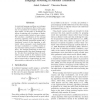Free Online Productivity Tools
i2Speak
i2Symbol
i2OCR
iTex2Img
iWeb2Print
iWeb2Shot
i2Type
iPdf2Split
iPdf2Merge
i2Bopomofo
i2Arabic
i2Style
i2Image
i2PDF
iLatex2Rtf
Sci2ools
126
click to vote
ACL
2008
2008
Distributed Word Clustering for Large Scale Class-Based Language Modeling in Machine Translation
In statistical language modeling, one technique to reduce the problematic effects of data sparsity is to partition the vocabulary into equivalence classes. In this paper we investigate the effects of applying such a technique to higherorder n-gram models trained on large corpora. We introduce a modification of the exchange clustering algorithm with improved efficiency for certain partially class-based models and a distributed version of this algorithm to efficiently obtain automatic word classifications for large vocabularies (>1 million words) using such large training corpora (>30 billion tokens). The resulting clusterings are then used in training partially class-based language models. We show that combining them with wordbased n-gram models in the log-linear model of a state-of-the-art statistical machine translation system leads to improvements in translation quality as indicated by the BLEU score.
ACL 2008 | Class-based Language Models | Computational Linguistics | N-gram Models | Wordbased N-gram Models |
Related Content
| Added | 29 Oct 2010 |
| Updated | 29 Oct 2010 |
| Type | Conference |
| Year | 2008 |
| Where | ACL |
| Authors | Jakob Uszkoreit, Thorsten Brants |
Comments (0)

